Ethiopian Coffee goes fully TRACEABLE! Grant Rattray gets the scoop first hand!
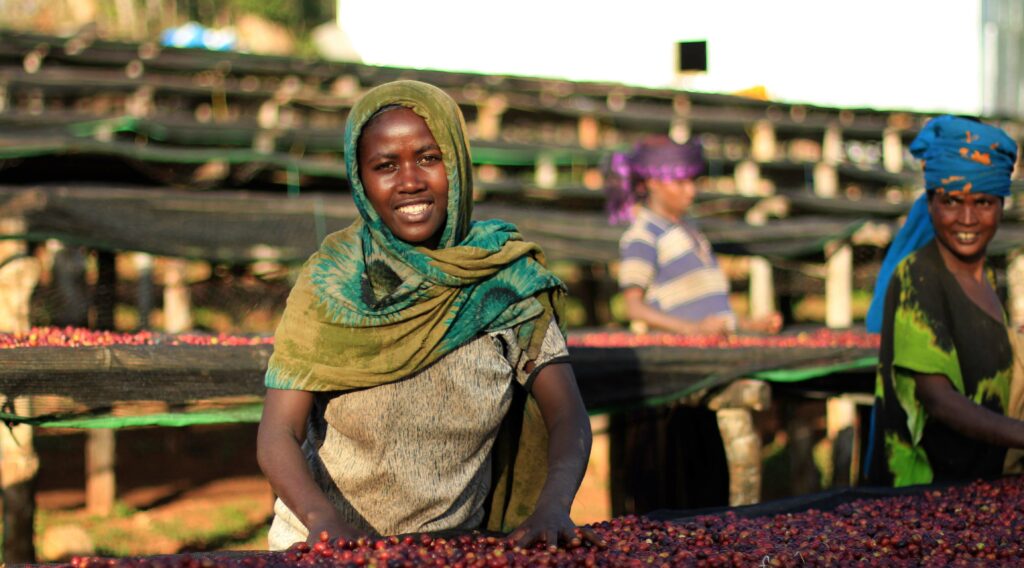
For many years, Mercanta has been telling you the same, old Ethiopia story:
In 2008 Ethiopia began the centralization of all coffee exports through the newly established Ethiopia Commodity Exchange (ECX). This eliminated most roasters’ and importers’ ability to provide accurate information of the precise traceability of coffees. Until December of that same year, growers could also sell direct to export markets, but this was subsequently reigned in. Since that time, the difficulty of determining precise provenance in Ethiopia – a corner stone of specialty coffee – has been a tremendous frustration to buyers in consuming markets.
As of the end of the 2017 harvest season, around 90 percent of coffees continued to move through the ECX, where they were cupped according to profile then graded and marked generically for export. G1 lots, such as this one, are the highest grade and are in limited supply. When purchased through the ECX, however, the only traceability information that has been given even to these highly sought after lots is the area code of production, such as ‘Sidamo’ or ‘Yirgacheffe’, which are coffee producing regions, or Kochere, Yirgacheffe, which denotes that this coffee comes, generally, from the town of Kochere and its surrounds in the Yirgacheffe producing region.
As of the end of the 2017 harvest season, only around 10 to 13 percent of coffee grown was eligible to be purchased ‘directly’ through cooperatives or plantations – a percentage that had remained relatively stable since the founding of the ECX. All of the Ethiopian coffees that we have traditionally purchased at Mercanta were selected on the basis of their exceptional cup profile first and foremost. This remains our guiding principle in Ethiopia and in all origins where we source coffees. But despite our equal commitment to traceability, we have abided always by the standards and laws set out by the originating countries (and will always operate 100% within these).
There is great news on the horizon though!
The Ethiopian Coffee & Tea Development and Marketing Authority has recently approved significant changes that will make it easier and entirely legal to get traceability on the coffees that buyers purchase. The new bill, raised in March of 2017 and aimed at limiting black market dealings, will be fully in effect for this year’s harvest.

We are very pleased to announce that our 2018 Ethiopian coffee offerings will be fully traceable down to region and washing station. We are working with our exporting partner in Ethiopia, as well, to get additional details such as collection point and even contributing farmers on some of the lots.
Mercanta will be working with Testi Coffee on this new undertaking. We have purchased from Testi for several years now, and they are a family run company who are committed to maximising the potential of Ethopian coffee.
Testi Trading’s objective is quality and building long term business relationships. Their washing stations are very well run and they do diligent work through sorting and screening to get clean and quality beans for export. Testi always adheres to the very highest quality standards to prepare and deliver nothing but high quality beans.
As of 2018, Testi has launched a quality improvement project at each of the four washing stations that they operate. Their PCS (Premium Cherry Selection) Project fully controls all aspects of harvest and processing in order to ensure that the fantastic natural quality of the coffee is maintained at each step. They are also making the most of the market liberalisation to benefit the small producers that they work with. Social projects, such as building new classrooms for the local school near their Guji processing factory are also important, and with support from their importing partners (watch this space) they hope to do even more in the future.
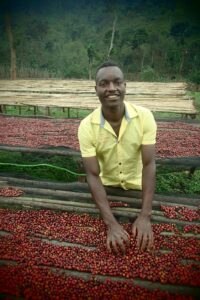 Guji Jigesa Coffee Washing Station
Guji Jigesa Coffee Washing Station
This washing station lies at 1,800 to 2,000 masl and produces amazing Natural and Washed lots. You probably recognise it as ‘Gigesa’ but the correct spelling is Jigesa we discovered through Grant’s recent trip!
Located in the Guji Zone (Oromia Region), Guji is named after a tribe of the Oromo people. Guji is bordered on the south and west by Borena, on the north by Gedeo and Sidama and on the east by Bale and the Somali Region. The Guji Zone was created in September 2002, when the upland woredas (towns) of the Borena Zone were renamed as Guji.
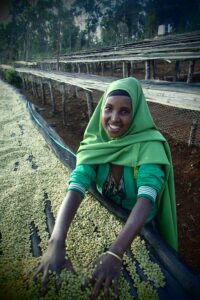
Sorting is key to quality
Borena is named after a tribe of the Oromo people. Borena is bordered on the south by Kenya, on the west by the SNNP region, on the north by Guji and on the east by the Somali Region.
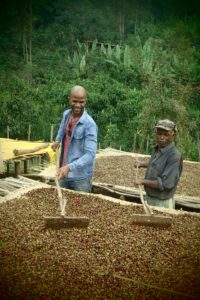
Jorge from Origin helps out!
Hedeso Washing Station
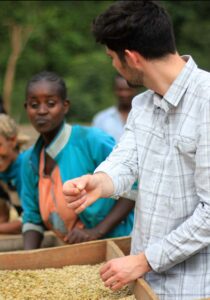
We aren’t sure Eddie from Round Hill is doing it right!
You may not recognise the name ‘Debo’ but this washing station is the home of our Kochere Yirgacheffe coffees! Like Tore, Debo Washing Station is run in collaboration with Masreshu Sima.